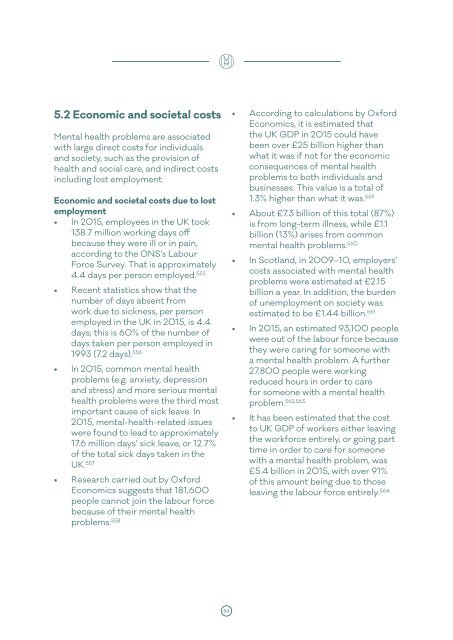FUNDAMENTAL FACTS ABOUT MENTAL HEALTH 2016
fundamental-facts-about-mental-health-2016
fundamental-facts-about-mental-health-2016
You also want an ePaper? Increase the reach of your titles
YUMPU automatically turns print PDFs into web optimized ePapers that Google loves.
5.2 Economic and societal costs<br />
Mental health problems are associated<br />
with large direct costs for individuals<br />
and society, such as the provision of<br />
health and social care, and indirect costs<br />
including lost employment.<br />
Economic and societal costs due to lost<br />
• According to calculations by Oxford<br />
Economics, it is estimated that<br />
the UK GDP in 2015 could have<br />
been over £25 billion higher than<br />
what it was if not for the economic<br />
consequences of mental health<br />
problems to both individuals and<br />
businesses. This value is a total of<br />
1.3% higher than what it was. 559<br />
employment<br />
• About £7.3 billion of this total (87%)<br />
• In 2015, employees in the UK took<br />
138.7 million working days off<br />
because they were ill or in pain,<br />
is from long-term illness, while £1.1<br />
billion (13%) arises from common<br />
mental health problems. 560<br />
according to the ONS’s Labour<br />
• In Scotland, in 2009–10, employers’<br />
Force Survey. That is approximately<br />
costs associated with mental health<br />
4.4 days per person employed. 555<br />
problems were estimated at £2.15<br />
• Recent statistics show that the<br />
number of days absent from<br />
work due to sickness, per person<br />
billion a year. In addition, the burden<br />
of unemployment on society was<br />
estimated to be £1.44 billion. 561<br />
employed in the UK in 2015, is 4.4<br />
• In 2015, an estimated 93,100 people<br />
days; this is 60% of the number of<br />
were out of the labour force because<br />
days taken per person employed in<br />
they were caring for someone with<br />
1993 (7.2 days). 556<br />
a mental health problem. A further<br />
• In 2015, common mental health<br />
problems (e.g. anxiety, depression<br />
and stress) and more serious mental<br />
health problems were the third most<br />
27,800 people were working<br />
reduced hours in order to care<br />
for someone with a mental health<br />
problem. 562,563<br />
important cause of sick leave. In<br />
• It has been estimated that the cost<br />
2015, mental-health-related issues<br />
to UK GDP of workers either leaving<br />
were found to lead to approximately<br />
the workforce entirely, or going part<br />
17.6 million days’ sick leave, or 12.7%<br />
time in order to care for someone<br />
of the total sick days taken in the<br />
with a mental health problem, was<br />
UK. 557<br />
£5.4 billion in 2015, with over 91%<br />
• Research carried out by Oxford<br />
Economics suggests that 181,600<br />
people cannot join the labour force<br />
because of their mental health<br />
of this amount being due to those<br />
leaving the labour force entirely. 564<br />
84


